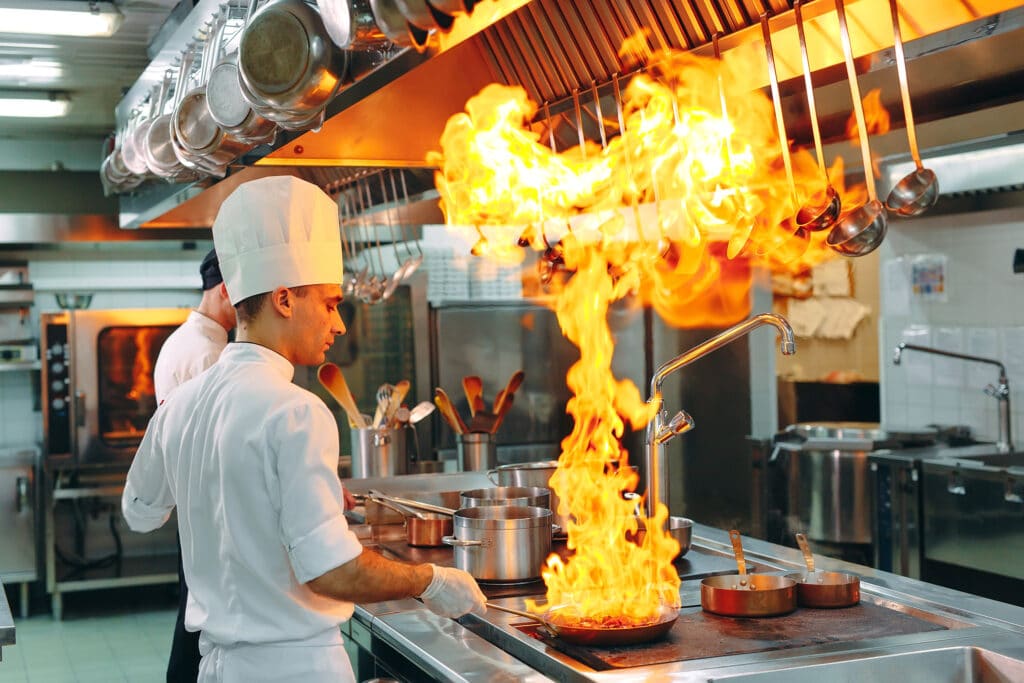Commercial kitchen flooring may experience severe punishments each day. Extensive foot traffic, constant moisture, hot greases, harsh cleaning solutions make the floor crack and wear prematurely. To top it, the government highly regulates commercial kitchens from sanitation inspections to keep safety and health in check. It is imperative to have a strong foundation in your commercial kitchen.
Below is a list of the best types of flooring for restaurants.
Tile
It is one of the most common types of commercial kitchen flooring. It is easy to clean, stain-resistant, and highly durable flooring material that can be cost-competitive. Made from sediments and clay at high temperatures in an industrial kiln, tiles are usually impact-resistant and rugged.
The standard type of tile used in commercial kitchens is quarry tile, which is unglazed clay tile and comes with a natural slip-resistant texture. Quarry tiles come in a limited range of colors, from gray to tan to reddish-brown. It usually has a standard square shape. Even though it is not the most beautiful flooring option, it is durable and cost-effective. The floor is slip-resistance that makes it appropriate for any kitchen environment.
Glazed ceramic tiles are similar to tiles used in homes. They are available in many styles and colors than quarry tiles. The glazed surface can be virtually impervious to waster and many staining agents. However, the glazed ceramic tile used in the kitchen must be slip-resistant to meet code standards.
Commercial Vinyl
Vinyl is a resilient material. It is thin and takes on the physical properties of the subfloor. If installed over something hard, like a concrete floor, you will get a hygienic floor that is easy to clean but resistant to damage and moderately durable. In a few cases, you can lay a padded underlayment layer by adding some cushion to the floor that helps to reduce fatigue and give greater comfort. However, the padding makes the floor more vulnerable to wear and damage. Hence, it is not suitable for many kitchen applications.
Available in tiles or sheets, vinyl is one of the most accessible flooring materials to install. Sheet vinyl has fewer seams making it less vulnerable to edge or water damage than vinyl tile.
Natural Stone
Natural stone tile is helpful in commercial kitchen environments, usually when appearance is the top priority. Stone flooring is tough and durable, like ceramic and quarry tile, but it can be relatively high-maintenance and much expensive. Unlike ceramic tile and quarry, there is a need to seal all stone tiles to prevent discoloration and stains.
You must choose stone tiles very carefully to use in the kitchen. It must be relatively flat and smooth and not have profound surface variations resulting in trip hazards. One of the crucial things to note is stone tile floors must be slip-resistant even when wet. Polished stone is much slippery for the kitchen environment.
Concrete
Concrete is one of the best options for front-of-house or kitchen flooring. Concrete is seamless, flat, and durable. The finishing can happen with several visual effects and surface textures, including inlays and decorative colors. Concrete flooring is also versatile and can work for a range of restaurant styles.
Concrete flooring is porous and must be sealed periodically to resist discoloration and stains from oils and food. Like all types of tile, concrete is also hard underfoot. Most kitchens use tiles or rubber mats to soften concrete flooring in critical work areas.
Epoxy
Epoxy flooring is made with additives, colorants, and epoxy resins for slip resistance and texture. One common additive is marble chips. The application is liquid that hardens; epoxy flooring is highly sanitary and seamless. It is helpful to refinish old kitchen floors and create a new, sealed surface. Epoxy can even be continued several inches up the kitchen walls to create a coved base, a seamless transition to shed water away from the corners to facilitate cleaning.
Conclusion
These are the types of flooring you can choose for commercial kitchens. If you are looking for the right kind of flooring for commercial kitchens, allow a professional concrete coating company to guide you while selecting your commercial kitchen flooring in NJ. Their knowledge and expertise will seamlessly support your concept and transform it into reality. You can concentrate on your success, service, and food by taking floor solutions off your plate.

